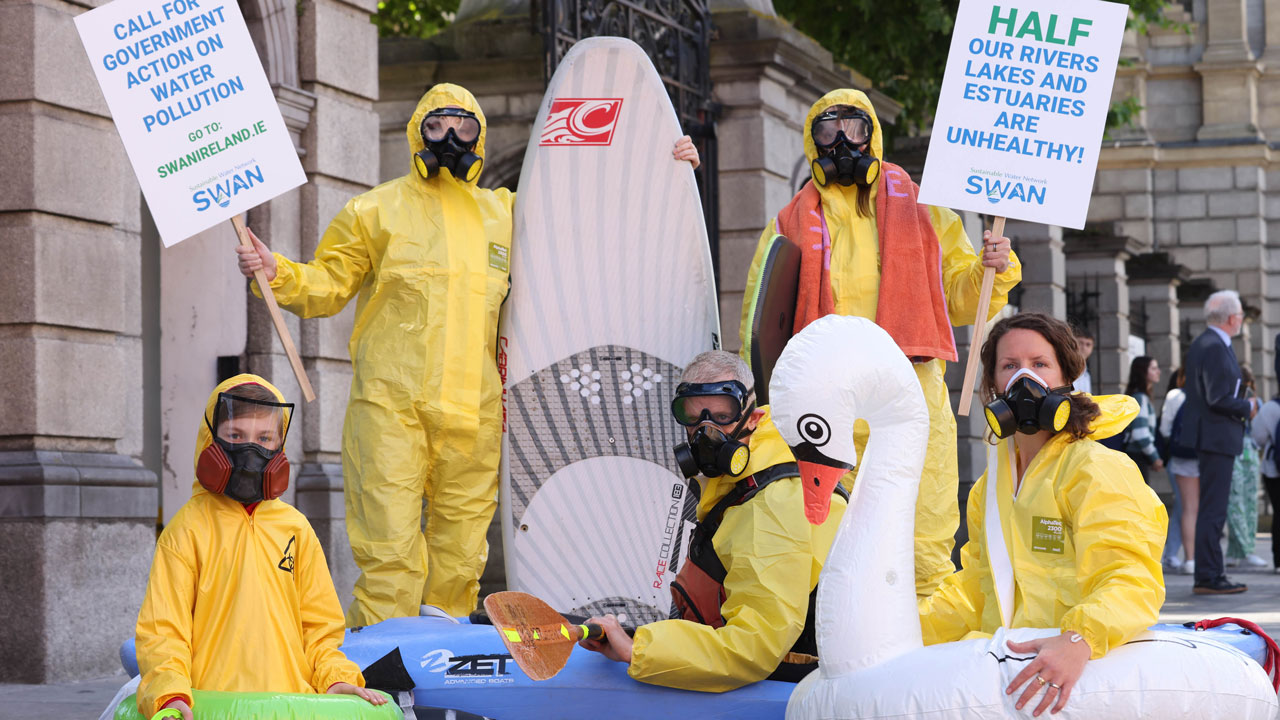The Sustainable Water Network (SWAN), a network of twenty five of Ireland’s leading environmental organisations, reacted to today’s EPA Water Indicator Report [1] by calling on the Government to come up with a more effective plan to address Ireland’s escalating water pollution crisis.
The report highlights that nearly half (44%) of our surface waters are unhealthy, Two fifths of our rivers, many in the south and southeast of the country, and a fifth of estuaries and coasts are below healthy levels for nitrogen, while nearly a third of rivers (28%%) and over a third of lakes (36%) are failing for phosphorus concentrations. Average nitrates levels have increased across our rivers and groundwaters while nutrient loads have also increased in our marine environment.
This escalating pollution is having a dramatic effect on our water wildlife. The much-loved kingfisher is on the amber conservation list of concern [2], and our iconic salmon numbers are in sharp decline [3], to give just two examples. Of course, unhealthy waters are unhealthy for humans too. Pollution regularly contaminates the water we drink when untreated; every year, bathing areas are closed throughout the country due to dangerous bacteria from pollution, while our precious waterscapes that we rely on for our well-being and recreation are deteriorating. We can’t have a healthy country without healthy waters.
The government is currently finalising the 2022-2027 River Basin Management Plan [4] . This is required under the EU Water Framework Directive [5] to lay out how we will restore our inland and coastal waters to a healthy state [6] by the mandatory deadline of 2027. The EPA water indicator report published today clearly shows that previous River Basin Management Plans have failed to address escalating water pollution and the wider water crisis, and that a much stronger approach is urgently needed in the new plan. However, the new plan in its draft form is much too weak, and is completely lacking in the ambition and targeted actions needed.
Sinéad O’Brien, SWAN Coordinator, said: “Another year and another report from the EPA showing yet again the ongoing failure of the government to address our water crisis and to stem the tide of water pollution. The government now has a golden opportunity to fix this in the upcoming River Basin Management Plan. This final plan will show whether this government is serious about the unhealthy state of our rivers, lakes and seas.
“The increase in nitrate pollution is mainly in the south and south east and is attributed to intensive agriculture pollution. This shows that current measures are not working and we need additional measures in the plan. Measures such as nutrient restrictions based on the carrying capacity of catchments and risk-assessments for intensive farms with a licensing system similar to pigs and poultry farms. These measures would result in a marked reduction in agricultural water pollution.
The high levels of phosphate concentrations are similarly coming from agriculture run-off but also from wastewater discharges. The plan must commit to urgent assessments and measures to halt wastewater discharges into all water bodies within the lifetime of the plan.
“Nutrient pollution is putting increased pressure on our coastal and estuarine waters, but the plan doesn’t even identify the specific pressures on these and the required measures to deal with them.
“Today’s report is even more evidence of the urgent need for much more ambition and commitment from the government to finally fix our escalating water pollution crisis and restore our rivers, lakes and seas back to good health.”
Notes:
[1] Water Quality in 2022 – An Indicators Report (2023) https://www.epa.ie/publications/monitoring–assessment/freshwater–marine/
[2] Inland Fisheries Ireland (2020) https://www.fisheriesireland.ie/what-we-do/research/technical-expert-group-on-salmon-tegos
[3] Gilbert G, Stanbury A and Lewis L (2021), “Birds of Conservation Concern in Ireland 2020 –2026”. Irish Birds 9: 523—544 https://birdwatchireland.ie/app/uploads/2021/04/BOCCI-2020-2026.pdf
[4] The Draft 3rd River Basin Management Plan (RBMP) – https://assets.gov.ie/199144/7f9320da-ff2e-4a7d-b238-2e179e3bd98a.pdf
[5] The EU Water Framework Directive – https://ec.europa.eu/environment/water/water-framework/index_en.html
[6] The Water Framework Directive requires “good status” or “high status” classification for all waters by 2027.
The Sustainable Water Network (SWAN) is an umbrella network of twenty-five national and local environmental groups working together for the protection and sustainable management of Ireland’s water environment.
SWAN Members: An Taisce, Bat Conservation Ireland, BirdWatch Ireland, Carra/Mask/Corrib Water Protection Group, Cavan Leitrim Environmental Awareness Network, Celebrate Water, Coastal Concern Alliance (Associate), Coastwatch, Coomhola Salmon Trust, Cork Environmental Forum, Cork Nature Network, Dodder Action, ECO-UNESCO, Friends of the Earth, Friends of the Irish Environment, Irish Peatland Conservation Council, Irish Seal Sanctuary, Irish Whale and Dolphin Group, Irish Wildlife Trust, Longford Environmental Alliance, Macroom District Environmental Group, River Shannon Protection Alliance, Save the Swilly, Slaney River Trust, Voice of Irish Concern for the Environment (VOICE).

